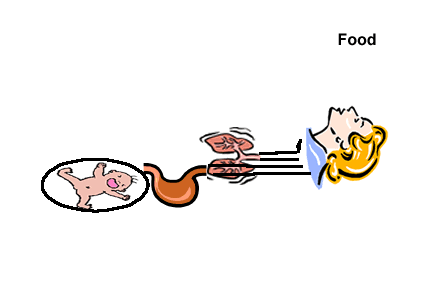Can I Eat or Drink During Labor and Childbirth?
| Why should there be a concern about eating and drinking during labor and delivery? There is a concern of food and liquids regurgitating from the stomach into the throat (reflux) and entering the breathing passage. This results in soiling and damaging of the lungs which may result in life threatening breathing problems (lung aspiration during labor) as shown in the figure below. This assumes even more importance if you need general anesthesia for childbirth. |
| Guidelines of oral intake during labor Solid food should be avoided during labor. Modest amounts of clear liquids are permissible.
|
| Recent national trends have encouraged the liberalization of oral intake of fluids during labor. A recently published Practice Parameters for Obstetrical Anesthesia by the American Society of Anesthesiologists Task Force on Obstetrical Anesthesia supports this practice (Anesthesiology, 1999;90:600-11 and Anesthesiology 2011;114:495-511). Moreover, recent evidence supports adverse metabolic consequences of prolonged starvation during labor, and supports the safety of moderate clear liquid intake during labor.
|
Fasting in the Obstetric patient: 1. Clear liquids: Oral intake of clear liquids during labor improves maternal comfort and satisfaction. Recommendations: The oral intake of modest amounts of clear liquids may be allowed for uncomplicated laboring patients. Examples of clear liquids include, but are not limited to, water, fruit juices without pulp, carbonated beverages, clear tea, and black coffee. The volume of liquid ingested is less important than the type of liquid ingested. However, patients with additional risk factors of aspiration (eg., morbid obesity, diabetes, difficult airway), or patients at increased risk for operative delivery may have further restriction of oral intake, determined on a patient-by-patient basis. Please consult your care providers regarding their guidelines. At our institution, patients may continue to have fruit juice, crackers and broth and other light foods, avoiding heavy solids or food with high fat content when admitted for induction or observation to the Labor and Delivery Unit, up until the time that they enter active labor, or until epidural catheter placement is requested. After regional analgesia/anesthesia placement, oral intake is limited to less than or equal to 8 oz/h of non-carbonated clear liquids: e.g. apple and cranberry juices, plain gelatin, tea, coffee without milk). In all circumstances, the anesthesiologist may limit this to a more restrictive policy based on individual patient concerns. 2. Solids: Solid food should be avoided in laboring patients. A fasting period of solids of 8 hours or more is preferable for uncomplicated pregnant women undergoing elective cesarean delivery. Once again, please check with your care providers and follow their guidelines. At our institution, when a woman is contemplating a surgery to 'tie the tubes' following the childbirth, she needs to abstain from oral intake, other than water, for 8h prior to the procedure. |

